Opening Talk: NoSQL in the Enterprise (Billy Newport)
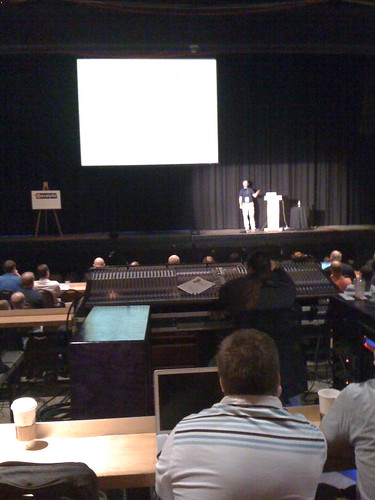
Came in halfway through this talk but really enjoyed what I heard. The talk pointed out how NoSQL datastores aren't a clean replacement for relational databases and that their use must be considered carefully because of inherent complexities that come with schema-less distributed data storage. This talk was video taped, look for it online when the conf talks are published.
Next talk: JavaScript Functions (Scott Bale)
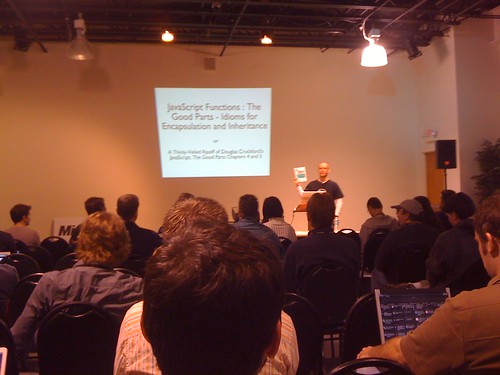
Scott went through a number of function invocation patterns that Douglas Crockford describes in his book, "JavaScript, the Good Parts". This talk was also video taped, look for it. I am in the process of reading the book this talk is based on at the moment and I recommend it for anyone who has an interest in JavaScript.
He discussed the use of constructor functions to restrict scope and access to data as well as using modules to apply a namespace to JS functions.
Next talk: Classes are a Premature optimization (Justin Love)
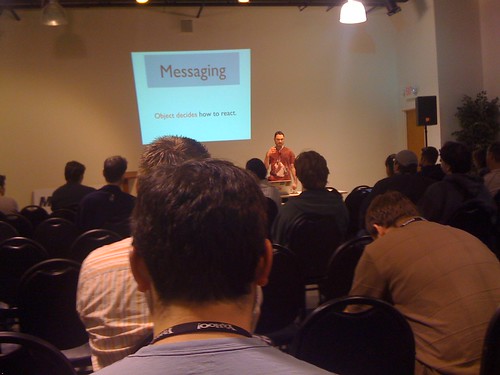
What many people think of as object-oriented programming seems to be class-oriented programming.
Class-based inheritance introduces complexities because classes are objects that have metaclasses.
Prototypal inheritance is simpler because there isn't a distinction between concepts like classes vs. objects. With a prototypal system, nested contexts form chains of connected functions, where type identity is traded for extensible, inheritable behavior.
The lunch hour had a panel discussion on NoSQL was well moderated by Ken Sipe, but the discussion left me wanting more. This was followed by a "dream team" panel discussion that included Douglas Crockford, Alex Payne, Guy Steele, Josh Bloch, Bruce Tate and was expertly moderated by Ted Neward.
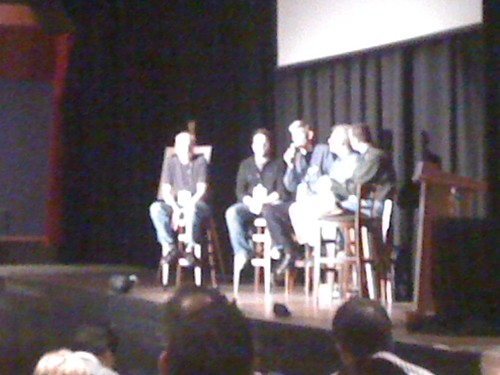
This was an often spirited discussion that ranged from topics like what languages new aspiring developers should learn, to whether programming languages will ever form to help make parallel problems more easy to address and understand.
Perl got a lot of hate in the languages panel. Bad show, panelists!
Next talk: Android Squared (Bob Lee & Eric Burke)
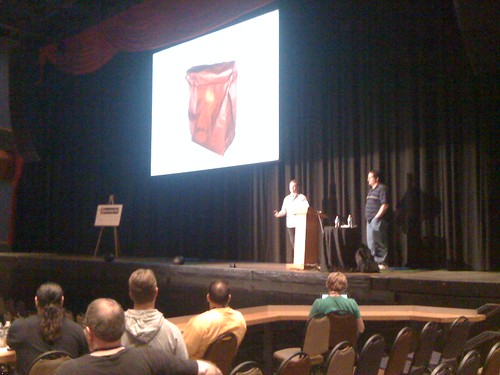
Eric explained how the Square reader decodes the wave form from the magnetic stripe on a credit card. They have to deal with peculiarities from different mobile devices interfering with the wave form from swiping a card as well as variations like swipe speed and other factors.
He also talked about how having a large database of swipe samples (containing phony numbers) allows them to write tests to examine holes in their decoding algorithms.
Square has released an open source library for Android that contains some Android and Java extensions (I believe): http://github.com/square/retrofit
Bob went into detail about how square queues metrics and server communication data on the device until it connects with the server. He also explained the API he wrote for reading and writing efficiently into flash file sectors on Android.
The queue file API and a shake API are included in retrofit. Bob later described a REST API that the android client uses to make network data exchanges.
Bob also shoed a POS app he wrote for Taste St. Louis in 2 hours that used the POS square API available for Android 3rd party apps. Very impressive!
Next talk: Dimensional Data in a distributed hash table (Mike Malone)

He spent the beginning of his talk describing CAP theorem and how at his company, their needs were better served by availability instead of consistency. They have implemented a distributed hash table implemented on top of Cassandra. The major points of his talk were: Integrity vs. Availability, Locality vs. Distributability, and Reductionism vs. Emergence.
Sadly, this talk was totally over my head.
Next talk: Outside-in TDD in Clojure (Brian Marick)
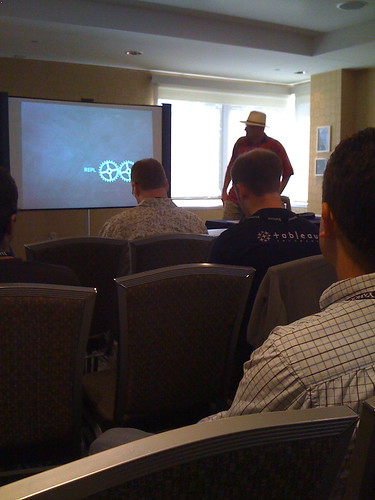
Brian contrasted Detroit-style TDD vs. London-style TDD (bottom-up vs top-down approach to designing systems guided by tests). He then played a pre-recorded coding example that showed the progressive implementation of an animal reservation system he previously created in Ruby.
Along the way, we got to see the mocking framework he is working on: Midje. In the coding example, we saw test definition, test execution result, and the code under test all within the same editor pane. This was interesting because it means that the eye doesn't have to move around the length and width of the monitor.
He explained why working with his mocking framework lets the course of development slice the problem domain into layers that can be tested totally independently.
Final Keynote: Douglas Crockford brought down the house

Epilogue
Strangeloop was an example of a brilliantly thought-out and executed conference. There was an excellent mix of well-known experts and new comers offering highly technical insight for a price within most developers reach. I'd say this was a conference that developers could ill-afford to miss and I can't wait to see what Alex Miller follows-up with next year.






1 comment:
I agree with your many of your comments. Although we attended several different sessions, the sentiment remained consistent.
Now one of the things that irritated me. On twitter, mass quantities of people were bashing java and maven. While it's hard to disagree with some of their points, it's old and stale. I can understand how many developers think java is "uncool" now but please, how many of us have made a living on the language for 10+ years. It allowed the glory of C++ without the sharp edges. As far as maven is concerned, I get it. Something better is out there, maybe 10 somethings. It's ironic that all that these new better mavens all build upon the ideas and concepts that maven brought mainstream.
Off my "pissy developer" soapbox. I'm a bit aggravated now that my 1999 Ford Explorer didn't have a GPS or blue ray player :)
Post a Comment